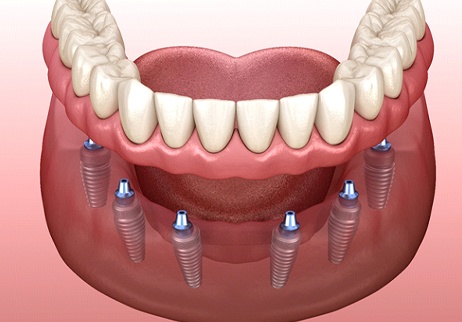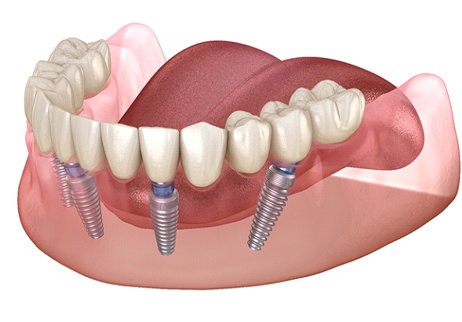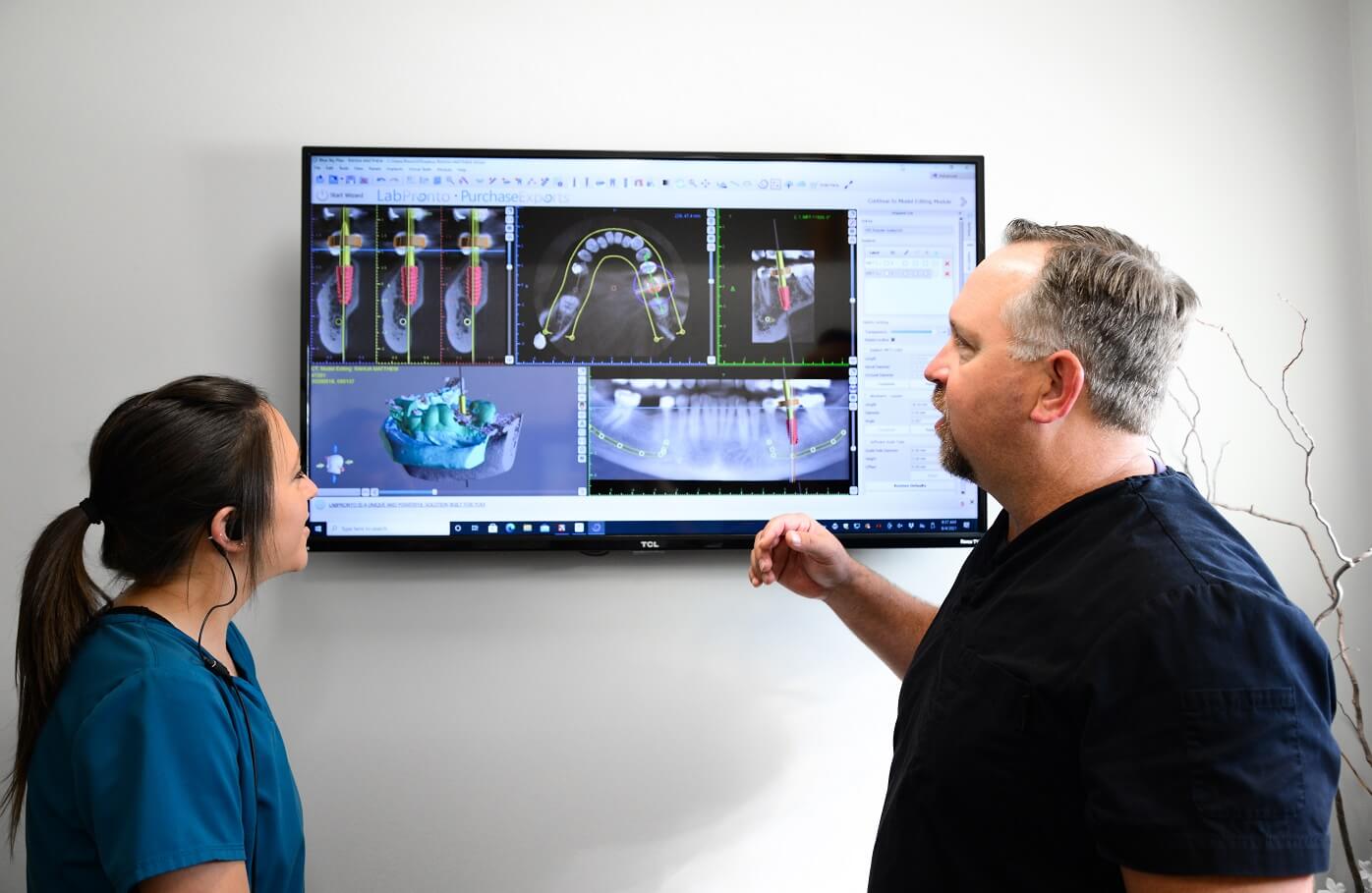Implant Dentures – Geneva, OH
Transform Your Denture with Modern Dental Implants
While a denture can be quite effective at replacing several or even all missing teeth, they only address half the problem. With an implant denture from our dentist, Dr. Owens, you can make your denture truly stable and reliable for many years to come and experience the benefits that dental implants have to offer, including root replacement. Call our office to get started!
Why Choose Dr. Cooper Owens for Implant Dentures?
- Completes Every Step of Treatment in One Location
- Highly Personalized Restorations for Best Esthetics
- Modern Dental Planning Technology Utilized
How Do Implant Dentures Work?
In contrast to traditional dentures, which rely on the shape of your mouth and natural suction to stay in place, implant dentures attach to a series of implants surgically placed throughout the jaw. Implant dentures typically snap in place, which means you can easily take it out for cleaning.
Am I A Candidate for Implant Dentures?

If you’re considering implant dentures, the first thing you should do next is schedule an in-person consultation. The good news is more patients are eligible for dental implants than ever before. However, you’ll still need to complete a detailed evaluation of your current smile and bone health before dental implants can be placed with confidence.
The Implant Dentures Procedure

After the planning phase of treatment is complete, our office will schedule you for dental implant surgery, which can be done right here in our office! This involves making a series of small incisions in your gum tissue, creating tiny holes where the implants will be housed, and placing the implants into the jaw.
From there, the gum tissue is stitched close and given time to heal. This process (known as osseointegration) takes about four to six months. During this healing phase, you’ll wear a temporary denture, so you can keep your smile while you wait for your permanent version!
Benefits Of Combining Dentures & Dental Implants
- A significantly improved biting strength
- Rejuvenated bone tissue and improved facial esthetics
- Thirty years or longer of reliable use
- No more slipping and sliding of your tooth replacement
- A natural-looking (and feeling) denture
Understanding the Cost of Dentures

Your financial situation should never prevent you from replacing your missing teeth. Although there’s not a flat rate for dentures, Dr. Owens strives to keep a complete smile within everyone’s budget. Various factors affect the cost of dentures in Geneva, like if you’re treating one or both arches. After examining your smile, Dr. Owens will explain the fees for your treatment plan and payment options. You’ll know exactly what you’ll have to pay, so you can focus on more important matters, like the journey ahead.
Factors that Affect the Cost of Dentures

No two smiles are the same, which is why there isn’t a one-size-fits-all denture. Several things contribute to the cost of your new smile, such as:
- Preparatory Treatments: It’s not uncommon to need a little prep-work before getting dentures, like tooth extractions or periodontal therapy.
- Number of Teeth: The severity of your tooth loss will affect the price tag because it determines the type of denture you’ll need.
- Materials: There are discounted materials, but you’ll pay more in the long run because they are often low-quality.
Dr. Owens will discuss all your options to help you make the best decisions for your smile and wallet.
Are Implant Dentures More Expensive?

Implant dentures are more expensive than the traditional method initially, but for good reason. Unlike a conventional denture, dental implants mimic the roots of your teeth. You’ll have unmatched support and stability for a nearly perfect replica of your real smile. The posts also keep your jawbone strong to stop the complications associated with tooth loss. With the potential to thrive for decades, implant dentures can even pay for themselves because you don’t need replacements every few years.
Does Dental Insurance Cover Dentures?

Most dental insurances can be used to pay for dentures in Geneva. It’s rare for a plan to cover the entire cost, but you can use your benefits to offset the fees of certain steps in your treatment, like the consultation, tooth extractions, or restorations. After reaching your annual deductible, your dental insurance can cover up to 80% of the cost. We know dental insurance is confusing, but you don’t have to navigate your policy alone. A member of our team will help you maximize your dental coverage to lower the amount you pay.
Other Options for Making Dentures Affordable

Besides using your dental insurance, we have various financial options to pay for dentures, such as:
- Traditional Payment: Our office accepts cash, checks, and credit cards.
- Dental Membership Program: We offer an in-house savings plan to enjoy reduced rates after paying an annual fee.
- Third-Party Financing: You can pay for your dentures using monthly installments through a third-party financing company, like CareCredit.
Everyone deserves to have a complete, beautiful smile. Your denture dentist in Geneva, Dr. Owens, can turn back the clock by replacing your missing teeth without spending your life’s savings. If you have questions about your payment options, contact our office today to speak with a member of our team.
Denture FAQs
If you’re receiving a denture for the first time, you may have many questions regarding their use or what you can expect from treatment. Dr. Owens wants to do everything possible to help you get used to your new denture, which is precisely why we’ve included an informative section dedicated to the most common questions the practice receives. Of course, feel free to call us directly if your question isn’t listed or you aren’t sure if you need to schedule an appointment to address your specific concern.
How long should I wear my denture for the first time?
Your mouth will need time to adjust to your new denture, so it’s important to keep wearing it as much as you can throughout the day. However, you should also remove it at night and well before you go to bed as this will prevent excessive irritation and soreness.
When should I visit to address problems with my denture?
Most of your daily activities should be easily doable after about 30 days of wearing and getting adjusted to your denture. If you still experience discomfort or difficulty wearing your dentures after a month, call our office and we’ll see what we can do to help.
How often should my dentures be repaired/relined?
On average, denture relines are performed once every 2 years. When properly maintained, dentures should only need to be replaced every 7 to 10 years. Relines improve the overall fit of your denture without having to make any major repairs or replacing the denture outright. Of course, if you feel that your denture doesn’t fit quite right before two years is up, you should give our office a call.
Is it okay to sleep in my denture?
No. Leaving your dentures in all the time, especially when you go to sleep, only allows bacteria buildup to develop inside your mouth and on your denture. This can cause bad breath, but in more severe cases it can even lead to an oral infection. Instead, place them in a dedicated denture cleanser or plain water when not in use. This will also work to keep them from drying out and warping or becoming worn-down too quickly.
What cleaning products are safe to use for a denture?
A mild dishwashing liquid or hand soap can be used to safely clean dentures. We also recommend soaking them in dedicated, over-the-counter denture cleansers, which are easy to find in major grocery stores and pharmacies. We do not recommend using toothpaste or household cleaners (such as bleach) as they can often be too abrasive for dentures. Keep in mind that you should still be using fluoridated toothpaste to keep your mouth and any remaining teeth clean.
Should I consider implant dentures?
If you’re looking for a way to make your denture more stable, implant dentures may be an option worth considering. Not only can our office provide this service, but we’re happy to keep every phase of treatment all under one roof. Simply give our office a call to see if you’re eligible for dental implant placement.

